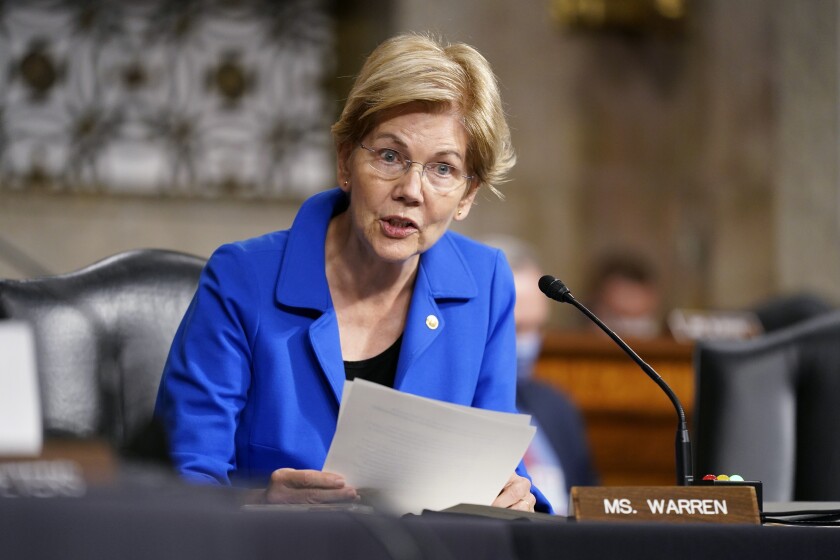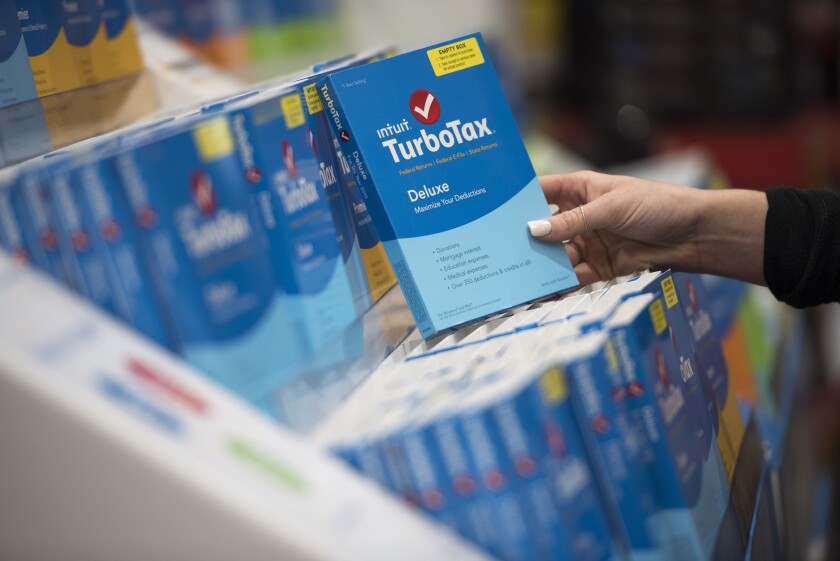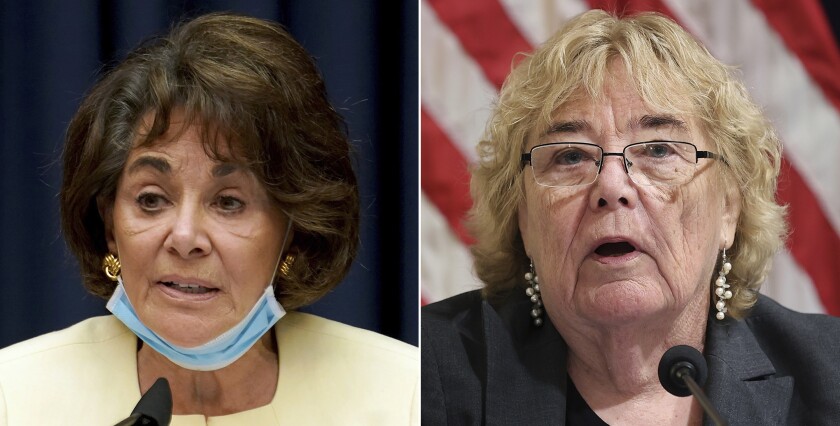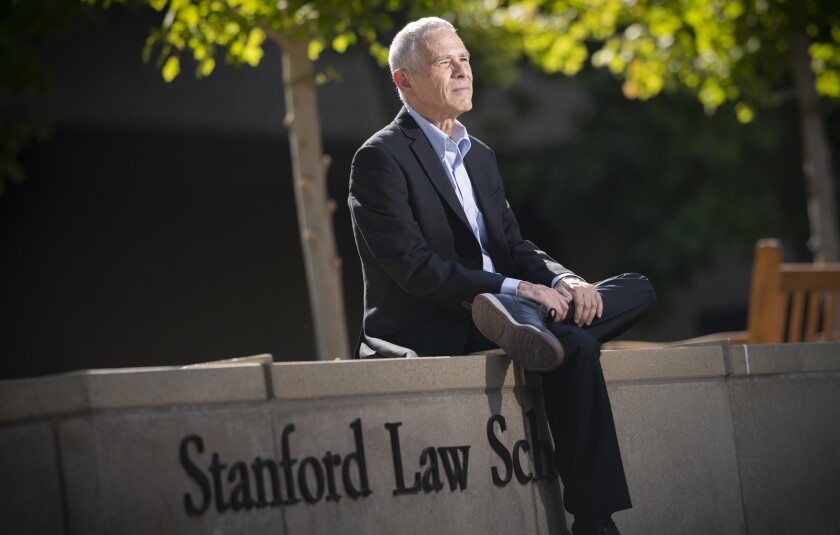California tried to save the nation from the misery of tax filing — then Intuit stepped in

Stanford professor Joe Bankman helped guide California through a test run of a “return free” tax system and still advocates for the project that he said participants loved. “People were thanking the government for taking something that drove them crazy and improving it.”
(Josh Edelson / For The Times)
BY EVAN HALPERSTAFF WRITER
OCT. 21, 2021 4:30 AM PT
FOR SUBSCRIBERS
WASHINGTON —
An unexpected letter from the state tax board is the kind of thing known to spike blood pressure. But the note that arrived in tens of thousands of Californians’ mailboxes in 2005 promised to ease anxiety.
The state proposed that these mostly modest-income taxpayers skip the aggravations of hunting for W-2s, the hassling with tax software, the lost evenings and weekends completing returns. Instead, the state could do it for them.
Californians participating in this test run of a “return free” tax system — a goal tax reformers had been chasing since President Reagan proposed it to the nation in 1985 — were so impressed that the thousands of comments that poured into a survey brought tears of joy to Joe Bankman, the Stanford Law professor who guided the state’s effort, which was branded “ReadyReturn.”
“They were just so touching,” he said of the comments about ReadyReturn, which was designed as a voluntary offering targeted at taxpayers on the lower end of the income scale. “One said, ‘Finally the government is doing something to make my life better for a change.’ Almost all the comments had the words ‘thank you.’ People were thanking the government for taking something that drove them crazy and improving it.”
Yet not everyone was thankful. Tax software firms faced an existential threat if the federal government were to follow California’s lead. Over the next decade and a half they worked relentlessly — and successfully — to stymie the California project and prevent others like it. They persuaded the Internal Revenue Service for more than a decade to pledge in writing not to adopt California’s innovation or develop any other offerings that threatened their business model.

Sen. Elizabeth Warren, shown Sept. 28, has called on the IRS to embrace a voluntary return-free tax system.
(Patrick Semansky / Associated Press)
“Can you imagine?” said Sen. Elizabeth Warren (D-Mass.), who for years has been calling on the IRS to embrace the California experiment. “Whose side are they on? ... This is the kind of problem we face in Washington over and over. A small number of well-funded corporations can keep Washington from doing the right thing, even when millions of people are hurt.”
Those companies persuaded the IRS to let them provide the government’s congressionally mandated free electronic filing service meant for most Americans, which was branded Free File. And now they stand accused of using that authority to swindle taxpayers by obscuring the Free File offerings online and luring consumers to other products marketed as free, but which often include steep fees.
Amid the unraveling of the industry-government partnership, California’s blueprint for ending the nightmare of tax filing for millions is getting another look at the national level.

No state has had a bigger impact on the direction of the United States than California, a prolific incubator and exporter of outside-the-box policies and ideas. This occasional series examines what that has meant for the state and the country, and how far Washington is willing to go to spread California’s agenda as the state’s own struggles threaten its standing as the nation’s think tank.
Read the series
This follows years in which a coalition of software firms led by Silicon Valley-based Intuit, the maker of TurboTax and a colossus that boasts 73% of the market share for tax preparation services, fought against California’s plan to follow the lead of countries like Germany and Japan. In those places, tax day is a nonevent. Citizens may get a pre-filled return that has all the salary, investment and other information the government already has in its files.
“There are about 30 countries that do this for a big chunk of their populations,” said William Gale, a senior fellow at the Brookings Institution, who has been writing since the mid-1990s about the potential for the U.S. to go that route. “I would have thought we would be further along by now.”
The tax preparation industry guided Washington down a different path.
It has ultimately led to the Federal Trade Commission and multiple state attorneys general girding to sue Intuit, alleging consumers eligible to file for free were lured into paying steep fees, according to filings at the FTC and Intuit corporate disclosures.
The Los Angeles city attorney and Santa Clara County are already enmeshed in their own court fights with Intuit and H&R Block, accusing them of exploiting low-income taxpayers. In a related class-action case, U.S. District Judge Charles Breyer in San Francisco this year rejected as too stingy a proposed $40-million settlement with taxpayers who say Intuit duped them. Now, some 126,000 TurboTax users have pursued arbitration claims against Intuit.

A coalition of software firms led by Silicon Valley-based Intuit, the maker of TurboTax and a colossus that boasts 73% of the market share for tax preparation services, fought against California’s plan.
(Peter Barreras / Associated Press)
Among the many who say they were misled is 49-year-old Loren Goldstein of Laguna Niguel, whose modest income as the operations manager of a small real estate appraisal and tax services firm qualified him to file for free. Yet Goldstein says in a court filing that when he clicked to a page Intuit billed as its free product, and then spent an hour inputting his information, he was informed at the end of the process he would have to pay.
“I felt manipulated into paying them,” Goldstein said in an interview. “I had spent an hour of my time already. What am I going to do? ... I questioned whether that was their intention the whole time. They are offering a free product. And then they are hitting you up for money before anything can be processed. It made me angry and frustrated.”
The lawsuits followed revelations, first reported by ProPublica, that Intuit and other companies coded their Free File websites so they would not turn up on most Google searches from taxpayers seeking no-cost filing. The findings were confirmed by independent government investigations, including one by New York state that led its superintendent of financial services, Linda Lacewell, to declare Free File “is broken and was exploited by commercial tax preparer companies to drive their own profits.”
The program was meant to aid more than 100 million lower-income taxpayers, but only 2.5 million were filing for free under the arrangement by 2019. Millions more were paying unnecessary fees, according to the investigations.

Stanford professor Joe Bankman helped guide California through a test run of a “return free” tax system and still advocates for the project that he said participants loved. “People were thanking the government for taking something that drove them crazy and improving it.”
(Josh Edelson / For The Times)
BY EVAN HALPERSTAFF WRITER
OCT. 21, 2021 4:30 AM PT
FOR SUBSCRIBERS
WASHINGTON —
An unexpected letter from the state tax board is the kind of thing known to spike blood pressure. But the note that arrived in tens of thousands of Californians’ mailboxes in 2005 promised to ease anxiety.
The state proposed that these mostly modest-income taxpayers skip the aggravations of hunting for W-2s, the hassling with tax software, the lost evenings and weekends completing returns. Instead, the state could do it for them.
Californians participating in this test run of a “return free” tax system — a goal tax reformers had been chasing since President Reagan proposed it to the nation in 1985 — were so impressed that the thousands of comments that poured into a survey brought tears of joy to Joe Bankman, the Stanford Law professor who guided the state’s effort, which was branded “ReadyReturn.”
“They were just so touching,” he said of the comments about ReadyReturn, which was designed as a voluntary offering targeted at taxpayers on the lower end of the income scale. “One said, ‘Finally the government is doing something to make my life better for a change.’ Almost all the comments had the words ‘thank you.’ People were thanking the government for taking something that drove them crazy and improving it.”
Yet not everyone was thankful. Tax software firms faced an existential threat if the federal government were to follow California’s lead. Over the next decade and a half they worked relentlessly — and successfully — to stymie the California project and prevent others like it. They persuaded the Internal Revenue Service for more than a decade to pledge in writing not to adopt California’s innovation or develop any other offerings that threatened their business model.

Sen. Elizabeth Warren, shown Sept. 28, has called on the IRS to embrace a voluntary return-free tax system.
(Patrick Semansky / Associated Press)
“Can you imagine?” said Sen. Elizabeth Warren (D-Mass.), who for years has been calling on the IRS to embrace the California experiment. “Whose side are they on? ... This is the kind of problem we face in Washington over and over. A small number of well-funded corporations can keep Washington from doing the right thing, even when millions of people are hurt.”
Those companies persuaded the IRS to let them provide the government’s congressionally mandated free electronic filing service meant for most Americans, which was branded Free File. And now they stand accused of using that authority to swindle taxpayers by obscuring the Free File offerings online and luring consumers to other products marketed as free, but which often include steep fees.
Amid the unraveling of the industry-government partnership, California’s blueprint for ending the nightmare of tax filing for millions is getting another look at the national level.

No state has had a bigger impact on the direction of the United States than California, a prolific incubator and exporter of outside-the-box policies and ideas. This occasional series examines what that has meant for the state and the country, and how far Washington is willing to go to spread California’s agenda as the state’s own struggles threaten its standing as the nation’s think tank.
Read the series
This follows years in which a coalition of software firms led by Silicon Valley-based Intuit, the maker of TurboTax and a colossus that boasts 73% of the market share for tax preparation services, fought against California’s plan to follow the lead of countries like Germany and Japan. In those places, tax day is a nonevent. Citizens may get a pre-filled return that has all the salary, investment and other information the government already has in its files.
“There are about 30 countries that do this for a big chunk of their populations,” said William Gale, a senior fellow at the Brookings Institution, who has been writing since the mid-1990s about the potential for the U.S. to go that route. “I would have thought we would be further along by now.”
The tax preparation industry guided Washington down a different path.
It has ultimately led to the Federal Trade Commission and multiple state attorneys general girding to sue Intuit, alleging consumers eligible to file for free were lured into paying steep fees, according to filings at the FTC and Intuit corporate disclosures.
The Los Angeles city attorney and Santa Clara County are already enmeshed in their own court fights with Intuit and H&R Block, accusing them of exploiting low-income taxpayers. In a related class-action case, U.S. District Judge Charles Breyer in San Francisco this year rejected as too stingy a proposed $40-million settlement with taxpayers who say Intuit duped them. Now, some 126,000 TurboTax users have pursued arbitration claims against Intuit.

A coalition of software firms led by Silicon Valley-based Intuit, the maker of TurboTax and a colossus that boasts 73% of the market share for tax preparation services, fought against California’s plan.
(Peter Barreras / Associated Press)
Among the many who say they were misled is 49-year-old Loren Goldstein of Laguna Niguel, whose modest income as the operations manager of a small real estate appraisal and tax services firm qualified him to file for free. Yet Goldstein says in a court filing that when he clicked to a page Intuit billed as its free product, and then spent an hour inputting his information, he was informed at the end of the process he would have to pay.
“I felt manipulated into paying them,” Goldstein said in an interview. “I had spent an hour of my time already. What am I going to do? ... I questioned whether that was their intention the whole time. They are offering a free product. And then they are hitting you up for money before anything can be processed. It made me angry and frustrated.”
The lawsuits followed revelations, first reported by ProPublica, that Intuit and other companies coded their Free File websites so they would not turn up on most Google searches from taxpayers seeking no-cost filing. The findings were confirmed by independent government investigations, including one by New York state that led its superintendent of financial services, Linda Lacewell, to declare Free File “is broken and was exploited by commercial tax preparer companies to drive their own profits.”
The program was meant to aid more than 100 million lower-income taxpayers, but only 2.5 million were filing for free under the arrangement by 2019. Millions more were paying unnecessary fees, according to the investigations.





